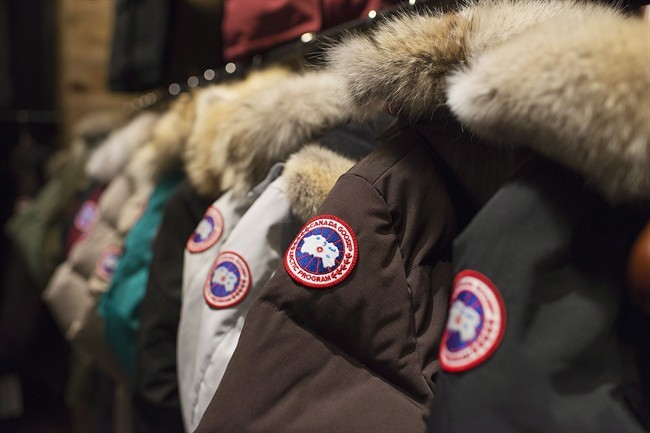Shares of Canada Goose, maker of the pricey parkas with Arctic expedition-like arm patches, started trading today on stock markets in Toronto and New York.

This was a long-anticipated initial public offering. The company priced its 20 million shares at $17 apiece, higher than the target range it had initially indicated, and the stock soared in early trading.
READ MORE: Canada Goose shares soar in debut on Toronto and New York stock markets
But one eager investor is raising eyebrows: the People for the Ethical Treatment of Animals (PETA).
The animal rights group bought $4,000 worth of Canada Goose shares, PETA spokesperson Ben Williamson told Global News today.
That was the “minimum amount required to contribute to shareholders meetings,” Williamson explained.
The point is for the group to attend annual meetings in order submit shareholder resolutions asking Canada Goose to stop sourcing animal products.
WATCH: “Designated Survivor” star Maggie Q joins forces with PETA to lead a protest outside of the Toronto headquarters of Canada Goose. ET Canada has the story.
PETA has long antagonized the Canadian manufacturer for using coyote fur trims and real down in much of its winter wear.

Get weekly money news
“Coyotes caught in traps are often bludgeoned, stomped on, or shot to death,” PETA noted in an online post dated March 13 where it announced its intention to buy Canada Goose shares.
READ MORE: PETA says fur protest ended Canada Goose partnership with Berlin Film Festival
Canada Goose noted in its IPO filing that “we only purchase down and fur from suppliers who adhere to our stringent standards regarding fair practices and humane treatment of animals.” It also indicated it has introduced new programs to track fur and down throughout its supply chain that will become fully effective in the spring of this year.
“Our products are made with down because it is recognized as the world’s best natural insulator, providing approximately three times the warmth per ounce as synthetic alternatives and, when necessary, trimmed with real fur to protect the skin from frostbite in harsh conditions,” the IPO document reads.
That’s not good enough for PETA, though.
READ MORE: PETA to protest opening night of ‘A Dog’s Purpose’ in Winnipeg
Acquiring a share in companies it targets is a tactic the organization has been using since 1987, Williamson told Global News. It’s a strategy PETA has deployed with, among others, Procter and Gamble, McDonald’s and another Canadian fashion brand: Lululemon.
Williamson credited the strategy for swaying car maker Tesla into making faux-leather an option for its new Model S and Model X electric vehicles.
READ MORE: All Tesla cars will now have self-driving hardware
According to its website, PETA used its position as a Tesla shareholder to ask the company’s CEO, Elon Musk, to switch to “all-vegan interiors.”
Once PETA introduces resolutions as a shareholder, “companies generally want to negotiate with us behind closed doors,” Williamson said.
PETA will hold on to a company’s shares until it feels “enough progress has been made,” said Williamson, who declined to specify whether PETA has now divested itself of any of the above-mentioned companies.
And what happens with the money PETA makes on such investments?
“Any profit that is made goes back to PETA’s work as a non-profit,” the group said.








Comments